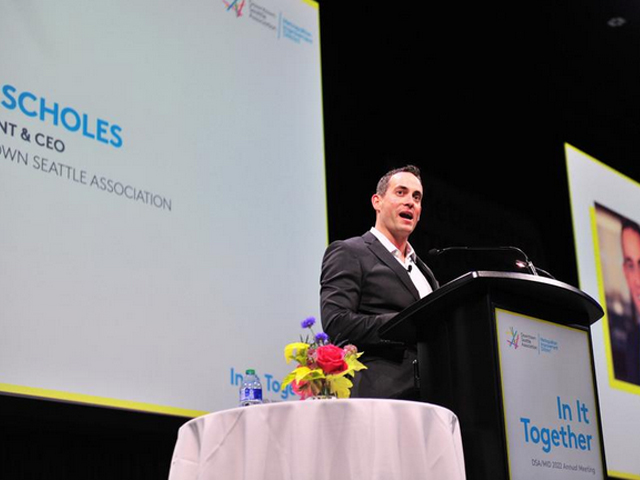News
PSBJ: DSA says there’s progress to report in effort to turn around downtown
Posted on

This story was originally published in the Puget Sound Business Journal on July 1, 2022
Downtown Seattle Association President and CEO Jon Scholes hates bananas. But he’s happy that Amazon is offering free bananas again from its stand outside of corporate headquarters in South Lake Union. It’s one sign of progress that he shared, among others, with DSA members at their annual meeting Thursday night.
“We’re going to push back against the narrative that downtown is a ghost town with boarded up buildings,” Scholes said. “Our focus in the coming months is to enhance the (downtown) experience and improve the perception,” he explained.
Scholes used data to debunk beliefs that downtown Seattle is vacant and dangerous:
- Foot traffic, from tourists, workers and residents, the week of June 13 was 80% of what was for the same period in 2019.
- Over that same June week, the number of hotel room nights sold was 96% of what it was for the same period in 2019.
- The number of people living in the 12 neighborhoods considered part of downtown Seattle, including Lower Queen Anne and Sodo, is currently 104,000, compared with 88,000 in 2019.
When describing crime downtown, Scholes said there’s been “some progress” between the winter and spring of this year.
The number of workers returning to the office at least three times a week in May was slightly ahead of April (41% the week of May 23) but ticked down a couple of points in June, indicating no clear upward trend.
Scholes referenced the 2022 Edelmann trust survey, which reports that nearly 1 out of 2 respondents saw government and media as divisive forces. Scholes said the trust consumers have for the private sector is “opportunity we must seize.” He called on DSA members to organize support to renew the Metropolitan Improvement District assessment in 2023.
The MID assessment is paid by businesses and property owners across six downtown neighborhoods across 285 square blocks. It funds a staff of uniformed ambassadors and private security officers who clean streets and alleys, remove graffiti, and to a growing degree assist people who are unhoused. The DSA makes clear that the work should be a supplement to what city government provides.
MID is a second-chance employer, offering jobs to people on parole or probation, or coming out of homelessness. Part of DSA’s annual meeting was to acknowledge the work of MID ambassadors, a few dozen of whom attended the event. DSA shared data on their work between July 2021 and May 2022:
- Gallons of trash removed: 1,262,646
- Graffiti tags removed: 25,549
- Incidents of human/animal waste removed: 26,949
- Syringes collected: 11,999
- People given directions: 17,910
- Events in public spaces: 1,329